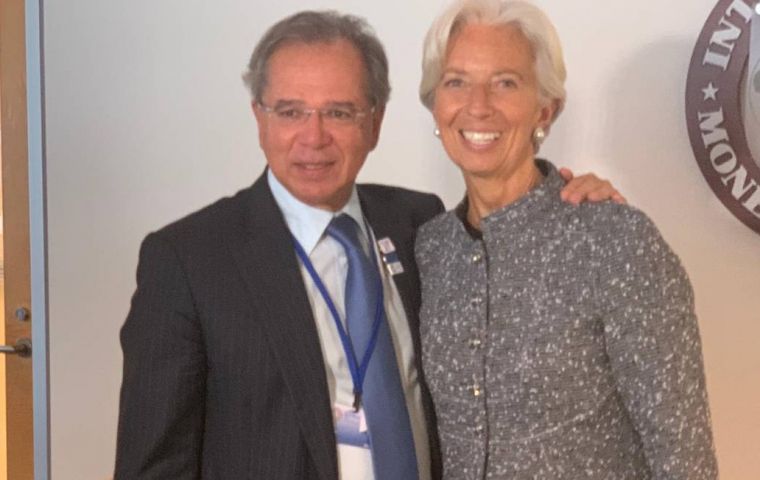MercoPress. South Atlantic News Agency
Global Inflation: Brazil's Guedes and Europe's Lagarde have opposing positions
 Speaking at the Davos Agenda virtual event, Guedes argued, “I think the central banks are sleeping at the driving wheel. They should be aware...”
Speaking at the Davos Agenda virtual event, Guedes argued, “I think the central banks are sleeping at the driving wheel. They should be aware...” Brazilian economy minister Paulo Guedes said that inflation will become a long-term challenge for Western countries, since “the beast is already out of the bottle”, and central bankers have been caught “sleeping at the driving wheel”.
Speaking at the Davos Agenda virtual event, last Friday, Guedes added, “I think the central banks are sleeping at the driving wheel. They should be aware, and I think inflation will be a real problem, a real problem very soon for the Western world”
“Far from being transitory as some central bankers have suggested, inflation is becoming a long-term issue for Western countries who have left themselves little room for maneuvers”, underlined Guedes.
“The supply adverse shocks, I think with time will fade gradually but there's no more arbitrage to be exploited by central bankers”.
Guedes then indicated that Brazil moved early to contain inflation pressures by cutting down Covid stimulus packages during 2021. “We took advantage of the recovery to remove gradually the monetary and fiscal stimuli.”
Guedes pointed out that given this anticipation, the government of Brazil has room to react if it needs to contain another coronavirus emergency.
However, despite Guedes's position, Brazil's economy briefly returned to pre-pandemic levels in 2021 but has since again slipped a few steps down. Likewise not all central bankers agree, such as the case of European Central Bank president Christine Lagarde.
Also at the Davos Agenda, Ms. Lagarde indicated that inflation in the Eurozone was unlikely to worsen dramatically because the “recent surge was due to short term pressures such as supply bottlenecks and energy prices”
“We see a lot of this super-strong recovery that has outpaced supply, which was constrained,” ECB president Lagarde said in an online panel discussing the threat of inflation on the global economy.
Consumer prices have risen significantly over the past year in many markets around the globe. The Eurozone inflation rate for December 2021 was 5% — a record high for the month. But the ECB has been reluctant to combat rising prices by raising interest rates, with Lagarde insisting that the current high inflation is the product of many factors, including temporary ones.
A combination of monetary and fiscal policies helped avoid massive layoffs during the pandemic and allowed the economy to bounce back more quickly than expected, she said.
“In a way, we are a victim of our own success,” Lagarde said.




Top Comments
Disclaimer & comment rulesCommenting for this story is now closed.
If you have a Facebook account, become a fan and comment on our Facebook Page!